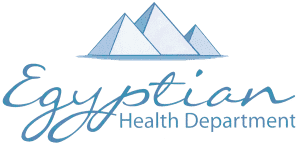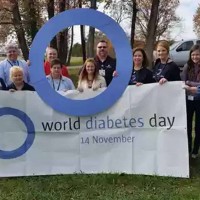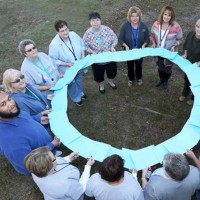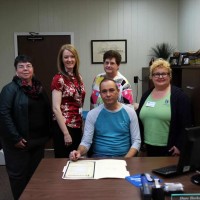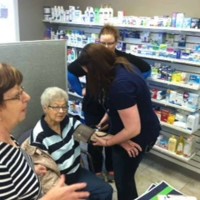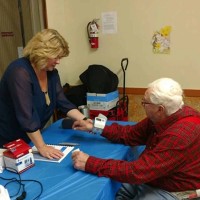Diabetes Self-Management Program
Live Well, Be Well: Take Charge of Your Health!
The Diabetes Self-Management Program (DSMP) is an evidence-based program developed by Stanford University, designed to help people learn to self-manage their diabetes, avoid complications of diabetes, and reduce expensive costs that accompany the treatment of those complications. Small Group (8-16), highly interactive workshops are six weeks long and meet once a week with facilitators who deal with diabetes either personally or thru a loved one.
Click here for information about DSMP.
Click here for upcoming workshops.
Contact
Kimberly E. Scott-Pilkington
Ph: 618-297-9380 ext. 203
Resources
Diabetes Resource Guide – 2022: Includes healthcare providers, insurance information, walking trails, useful phone apps, and other helpful resources for those in the 15 Southern Illinois counties and surrounding areas.
-
Take Charge of Your Health: Live Well, Be Well workshops signup!
What is Diabetes?
Diabetes is a disease in which the body’s ability to produce or respond to the hormone insulin is impaired, resulting in abnormal metabolism of carbohydrates and elevated levels of glucose in the blood and urine.
There are several different types, though 90-95% of diabetics diagnosed are Type 2. Type 1 diabetes and gestational diabetes are the other two main types of diabetes. See multiple types here. (Types of diabetes info can go here.)
Symptoms of Diabetes
Symptoms of diabetes include excessive thirst, very dry skin, slow-healing sores, frequent urination, extreme hunger, unexplained weight loss, increase in infections, blurred vision, numbness or tingling in the hands or feet, consistent fatigue, irritability, and the presence of ketones in the urine. Some individuals only experience some symptoms, and others don’t experience any at all.
The presence of symptoms depends on the type of diabetes. People with Type 1 diabetes typically experience severe, sudden symptoms, while people with Type 2 diabetes may not have any symptoms.
Type 1 diabetes generally develops in childhood; however, it can develop at any age. Type 2 diabetes is most common in people over the age of 40, but it can develop at any time. Gestational diabetes occurs as a result of pregnancy. The type of diabetes can be determined by several antibodies tests. A more recently identified type, Latent autoimmune diabetes of adults (LADA) or Type 1.5 is a blend of Type 1 and Type 2 antibodies.
Treatment of diabetes
There are many current treatments for diabetes. Diet, exercise, adequate sleep, and stress reduction can help all diabetics better manage their disease. Type 1 diabetics also require the hormone insulin to be injected to live. Type 2 diabetics sometimes take oral medications or other injectable medications to help manage production of insulin and the way their bodies use the insulin they have. Eventually, Type 2 diabetics also use insulin. Other diabetics manage with any combination of insulin and other drugs. Technology has been a huge help to many diabetics who can gain access.
Diabetes Today Resource Team (DTRT)
Who We Are
In the fall of 2015, Egyptian Health Department through partnership and collaboration with the Southeastern Illinois Community Health Coalition (SICHC)-Healthy Living Action Team and Southern Illinois Healthcare (SIH) formed a subgroup called the Diabetes Today Resource Team (DTRT). The DTRT is made of up diverse community members within the three counties who are interested in decreasing the incidence of diabetes, and assisting in the management of diabetes by strengthening diabetes education and prevention.
Our Goals
The (DTRT) members will work together to:
Expand the Diabetes Resource Guide to include Gallatin, Saline, and White counties of Illinois for Healthcare Providers and those with Diabetes.
Increase the proportion of persons with diagnosed diabetes who receive formal diabetes education.
Increase the proportion of people with prediabetes or multiple diabetes risk factors that practice diabetes prevention and control behaviors.
Vision
To increase knowledge and awareness in the three county region about diabetes including diabetes resources and support.
Our Mission
To work together toward the prevention and control of diabetes, and to improve the quality of life of those who are at risk for or affected by diabetes.
Methods
The DTRT will meet regularly to plan and implement strategies that promote diabetes prevention and control.
Members
Current participating groups, agencies, and individuals include: Button Chiropractic Natural Health Center, Community Members, Egyptian Health Department, Ferrell Hospital, Fresenius Medical Center, Golden Circle, Harrisburg Medical Center, Illinois Department of Veteran Affairs, Michael Stewart and Associates, Scates Valley, Southern Illinois College, University of Illinois Extension, Wabash Christian Village, Walmart Pharmacy, WEBQ, and Woodmen Life Insurance.
Contact Us
You are invited to get involved by becoming a member of the Diabetes Today Resource Team. If you or your organization is interested in joining, please contact Kimberly Scott-Pilkington, Egyptian Health Department (618) 297-9380 x203.
